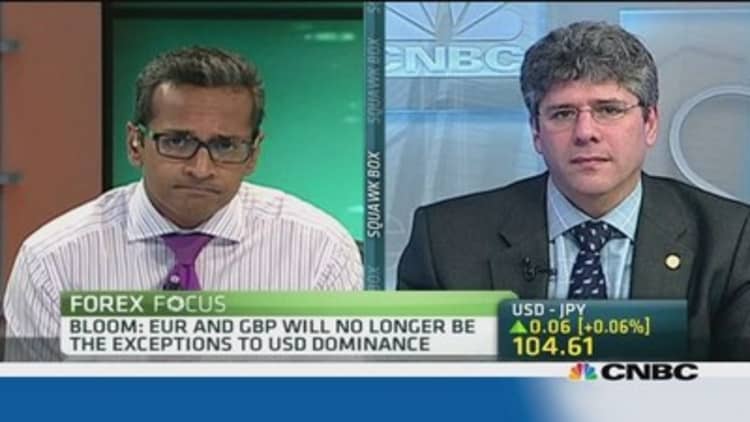
There seems to be no reprieve for the struggling Australian dollar, which suffered another bout of selling Thursday following poor jobs data, but one analyst says the currency may soon be in good company.
According to David Bloom, HSBC's global head of foreign exchange strategy, the euro is at risk of following the same course as the ill-fated Aussie.
"The Aussie tells you about the euro. Everything was right for the Aussie to go down. They [Reserve Bank of Australia] were cutting rates, China was slowing, commodity prices went down but the Aussie stayed elevated. Then one day, boom it went down. The exact same thing is going to happen to the euro," David Bloom, global head of foreign exchange strategy at HSBC, told CNBC.
(Read more: Will Australia's jobs shocker put the RBA to work?)
In a similar fashion, the euro managed to outperform in 2013 despite a variety of negative factors, such as tepid economic growth and dollar strength.
In the first two weeks of the New Year, both the Aussie and euro have fallen 1 percent.
A strong easing bias from the Reserve Bank of Australia contributed to a 15 percent loss for the Aussie in 2013 and Bloom expects looser monetary policy in Europe via long-term refinancing operations to trigger similar declines for the euro this year given lackluster economic results so far.
(Read more: Sit up and take notice, Aussie pain is here to stay)
"Europe is heading towards disinflation even deflation. We saw those German growth numbers on Wednesday, 0.4 percent for the year, and people are saying Germany is the powerhouse of Europe? What is going on here? They [the ECB] just cut rates acouple of months ago," Bloom continued.
Nizam Idris, head of strategy, fixed income and currencies at Macquarie, also expects lingering disinflationary pressure to weaken the currency, citing a target of $1.32 to $1.34 over the next six months. The currency last traded above $1.36 per dollar after hitting a one-week low of $1.3581 overnight.
(Read more: Europhoria or europhobia: Which camp are you in?)
Wednesday's better-than-expected November trade surplus in the euro zone did provide some relief for euro bulls. Attention now turns to Thursday's consumer price inflation data for further trading cues.
"Technically, looking at the charts, we see there is a lot of support buying at current levels. I would love to be short euro but at this stage, looking at the charts, we really need to stay long here," said Andrew Abrahamian, head of FX strategy at Compass Global Markets.
(Read more: Europe has lost its way: Former Slovakian PM)
But HSBC's Bloom remains defiant in his call.
"People are seeing the euro above $1.35 and getting all excited but these were the same people who forecasted the euro to break up two years ago and are now trying to make up for it by now forecasting the euro to go up a long way."
— By CNBC.com's Nyshka Chandran. Follow her on Twitter @NyshkaCNBC

